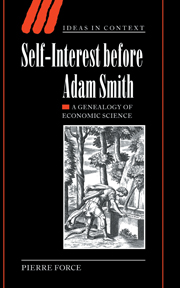Book contents
2 - Epicurean vs. Stoic schemes
Published online by Cambridge University Press: 22 September 2009
Summary
The Church fathers claimed to have much scorn for the virtues of the ancient Pagans which – according to them – had no other principle than vainglory. Nevertheless, I believe they might have been extremely perplexed to prove such a reckless assertion solidly.
Rousseau, Political FragmentsTRAHIT SUA QUEMQUE VOLUPTAS
Mandeville, the polemical target of Smith and Rousseau, defends a doctrine that is highly ambiguous. Because Mandeville sees the quest for pleasure as the source of human actions, he may be called an Epicurean. E.J. Hundert reminds us that Mandeville was defending “an ancient insight into the fundamentally egoistic sources of human behavior – a thesis still associated in the early eighteenth century with Lucretius (ca.94–ca.50 bc), whose epic De rerum natura contained the most detailed classical exposition of the atomist, hedonist and purportedly atheist doctrines of Epicurus (341–271 bc).” Others insist on the similarities between Mandeville's critique of human virtues and La Rochefoucauld's Maxims. As the editor of The Fable of the Bees puts it, “much of Mandeville's philosophy might be summarized as an elaboration of La Rochefoucauld's maxim, ‘Nos vertus ne sont le plus souvent que des vices déguisés’, with le plus souvent changed to toujours.” This would categorize Mandeville as a representative of the Augustinian tradition. At first sight, these two interpretations are strictly incompatible. On the one hand, a doctrine that was famously hostile to religion. On the other hand, a tradition that went back to a pre-eminent Father of the Church.
- Type
- Chapter
- Information
- Self-Interest before Adam SmithA Genealogy of Economic Science, pp. 48 - 90Publisher: Cambridge University PressPrint publication year: 2003



